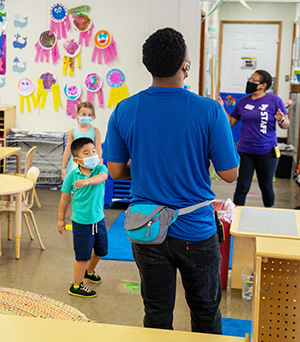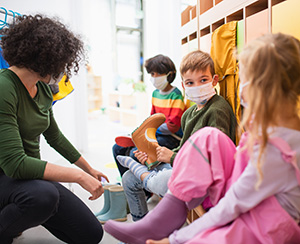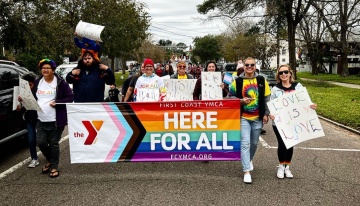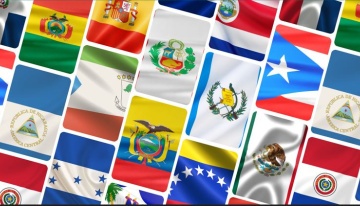Always There for Families: Child Care During the Pandemic
The COVID-19 pandemic has stressed the critical need for safe child care and out-of-school-time options for families. Child care enables parents to work and ensures that employers have access to a steady workforce while providing kids with enrichment and support to help them navigate uncertain times. The Y — the nation’s largest nonprofit provider of child care — has responded to the pandemic by filling community gaps so children won’t fall behind in their academic, social-emotional and physical development. Along the way, we have learned important lessons that have allowed Ys to adapt nimbly to the changing needs of our communities as we work towards recovery together.
Year One 
In March 2020, as schools began to close, Ys across the U.S. mobilized to offer emergency child care for health care workers, first responders and other essential personnel at more than 1,100 sites. YMCA of the USA (Y-USA), coordinated directly with the Centers for Disease Control and Prevention (CDC) to develop emergency and essential child care guidelines. By summer 2020, Ys were providing care to more than 40,000 kids so that the nation’s frontline workers and other parents who needed to work outside the home could report to their jobs knowing that their children were in safe, stimulating environments.
As summer approached, Ys applied lessons from operating emergency child care to planning summer camp experiences. The American Camp Association partnered with Y-USA to create a field guide of best practices to operate camps safely during the pandemic. The guide was developed in partnership with Environmental Health and Engineering, Inc. and an expert panel of pediatricians, nurses, epidemiologists, infectious disease specialists, industrial hygiene experts and environmental health scientists. With this preparation, the majority of the Y’s 10,000 day camps were able to open safely and provide child care and youth enrichment programs for families during the summer months. And where possible, overnight camps shifted operations to run summer programs to help meet family needs.
That fall, a growing need emerged as children and families adjusted to remote or hybrid learning. In response, more than half of the nation’s Ys partnered with their school districts to offer learning labs and academic support programs, including 21st Century Community Learning Centers (21st CCLC), at more than 1,500 sites. Learning labs provided supervised, physically distanced remote learning spaces that offered a safe and enriching environment for children to learn virtually while providing essential child care for parents as many returned to in-person work environments. Y remote learning spaces and 21st CCLC programs provided holistic programming that not only sought to meet the needs of children during the 2020-2021 school year, but their families as well.
 A New Year (2021)
A New Year (2021)
With a year of experience safely operating early learning, afterschool and summer programs, Y day and resident camps opened their doors in summer 2021 with the goal of re-engaging and reconnecting young people to help prepare them for success when they returned to school for the upcoming school year. These summer programs supported students’ social-emotional development, mental health and emotional well-being, physical health and academic achievement. As a leader in Positive Youth Development (PYD), the Y knows that summer is a springboard to accelerate learning, encourage discovery, promote creativity and build character, and connecting students outside of school is critical to their achievement in school.
As fall 2021 approached, Ys continued to develop school partnerships designed to connect in- and out-of-school learning to help support students’ social-emotional development and combat COVID-related learning loss. Because Y afterschool and summer program models strengthen achievement, belonging and relationships — the core drivers facilitating kids’ healthy development — Ys will remain steadfast in their dedication to partner with schools as we all look toward recovery from the pandemic.
Providing child care is one of the key ways the Y commits to advancing equity for all.
Lessons Along the Way
Lessons Along the Way
As the nation’s leading nonprofit dedicated to strengthening communities, the Y has always adapted to meet the unique needs of the communities we serve. In the process of responding to the COVID-19 pandemic, we’ve learned some important lessons that have guided our work:
- Nonprofits play a pivotal role during community crisis. Trusted community-based organizations, like the Y, provide a vital link between the community and health, educational and social service systems.
- The nation’s economic recovery depends on access to child care. Access to quality, affordable child care ensures that parents can work and that businesses have a stable and available workforce. When Ys provide child care in their communities, they are not only supporting holistic youth development but also fueling the economic engines that keep our country running.
- Collaboration across the child care continuum is pivotal. Early learning and school-age child care providers have worked together diligently throughout the pandemic. They have elevated the realities and needs of the child care sector and educated stakeholders on how best to meet these needs through partnerships and funding opportunities.
- Community collaborations spur innovation and make us all stronger. Meeting family and community needs during the pandemic has meant forging new community partnerships and developing new approaches to strengthen the web of community supports available. For the Y, it has also meant intentionally sharing learnings and strategies amongst Ys and with other service providers. Collectively, we are all stronger and better together.
- Access to child care is an equity issue. All children, regardless of background or socioeconomic status, deserve the opportunity to reach their full potential through enriching, quality learning experiences. Additionally, parents and caregivers require access to safe, affordable child care in their local communities to meaningfully participate in society. Providing child care is one of the key ways the Y commits to advancing equity for all.
Looking Ahead
For more than 170 years, the Y has been committed to helping people and communities—especially in times of crisis. Today is no different. While we cannot know the future, we know that the Y will be there to help children and families access the resources they need to reach their full potential. And when this crisis is over, the Y will be there to help our communities collectively recover, rebuild and heal.






